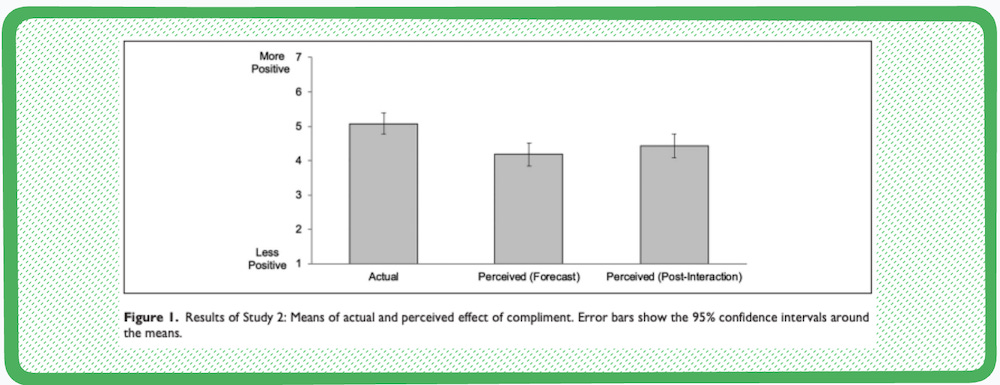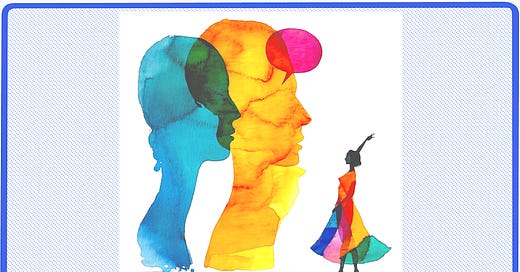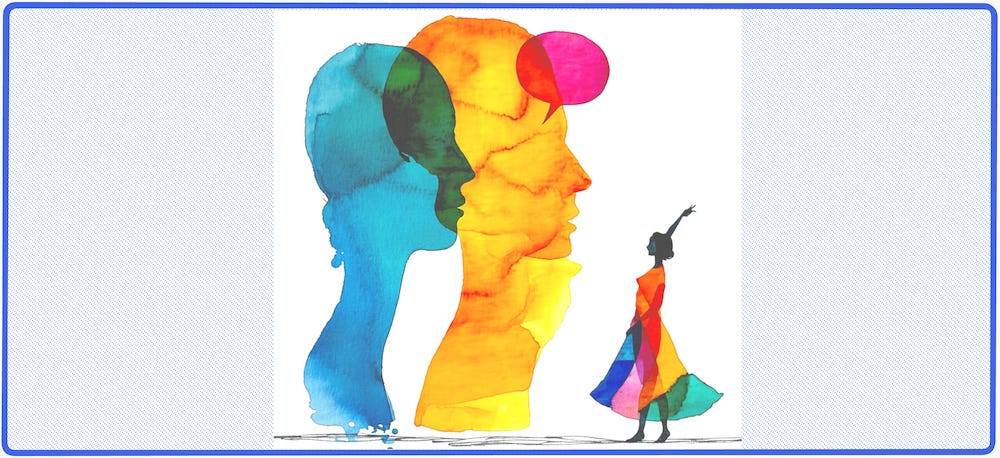You should give compliments to strangers.
For one, it feels nice. Complimenting a stranger makes both the giver and the receiver feel measurably more positive. And for two, it builds social currency.
Giving great compliments, especially to strangers, builds the muscle you’ll need to be more liked, charismatic, and persuasive in other areas of your life. If you feel shy or awkward in social environments, or struggle to strike up conversation with people you don’t know, giving compliments is a great way to build confidence.
There’s a lot of pop-psychology written on “social influence theory” and it ranges from boring and obvious to Machiavellian and creepy. Books like Cialdini’s Weapons of Influence, Carnegie’s How to Win Friends and Influence People, and Greene’s 48 Laws of Power are interesting in that they say the quiet part out loud: complimenting people makes them like you.
Cornell researcher Vanessa Bohns (author of the study linked above) said in an interview, “When we get a compliment, it gives us that feedback we want to know so badly about what other people think of us.”
In How to Win Friends and Influence People, Carnegie says our desire for appreciation is the “urge that differentiates us from the animals. It is this urge that has been responsible for civilization itself.” A touch hyperbolic perhaps. But here’s what is objectively true: People are more likely to agree with or trust you when they feel valued and appreciated.
Flattery vs compliments
Before I bring in the expert advice, let’s define our terms: compliments and flattery are different. A compliment is altruistic. Flattery is tactical.
Flattery is used to inflate the other person’s sense of importance. I really don’t care if you flatter people, just don’t go around thinking you’re benevolent and magnanimous. Flattery is a form of social manipulation in service to your own goals. A compliment is an act of service.
That said, compliments aren’t entirely selfless. The giver is rewarded with a hit of dopamine and bonus charisma points. But the key difference is that compliments aren’t transactional; you don’t give it expecting anything in return.
Why compliments matter
Compliments fulfill a fundamental human need. They affirm individuality and social belonging. Being a deft complimenter makes you more approachable, engaging, and likable in any environment.
Receiving a compliment triggers reciprocity and matching behavior—our psychological instinct to respond in kind. This makes people more receptive, willing to listen, and motivated to return the favor.

Linguist and researcher @iwsfutcmd (iw.) has made a study of compliments. You may know him for his dapper style, or incomprehensible tweets about classical Chinese, but on the subject of social skills, iw. says compliments are essential.
“When you make it a habit, you exude an effusive, positive regard that makes people want to be around you,” he said.
How do you give a great compliment? Here is his key advice:
How to give good compliments
Be specific
Vague compliments like “you look nice” aren’t memorable. Focus on a specific detail or a thoughtful observation.
Weak: “Nice outfit.”
Strong: “Your tie and vest are so well-coordinated.”
Compliment what they can control
Focus on choices they’ve made, like their creativity, taste, or style.
Avoid defaulting to physical attributes which can sound flirtatious or intrusive.
Weak: “You have nice eyes.” “You’re so tall.”
Strong: “I love the colors of your outfit, so much personality!” “That book is one of my favorites—such a great choice.”
Create an exit
No strings attached: the best compliments are casual, given in passing, and free from expectation.
Don’t linger or demand acknowledgment.
Best practice: compliment someone when crossing them on the street, as you’re leaving the cafe, or just before you hop off the metro. If you stumble or feel awkward, you’re already in motion toward a quick exit.
Credibility
A compliment carries greater weight when there’s credibility, like an obvious shared interest or common ground.
If you praise someone’s vibrant green dress, and you’re dressed in bright colors too, they'll sense the shared enthusiasm.
A well-coiffed person complimenting another’s beard shape or haircut telegraphs a depth of understanding/authenticity.
No compliments about bodies
Don’t compliment someone’s body size or shape. That involves too much implied judgment and risk of misinterpretation. Also, you don’t know them, don’t be weird.
Tattoos: if the tattoo is fully visible, you can compliment it; if it’s half or mostly covered by clothing, don’t compliment or ask to see it, that’s invasive and creepy.
Don’t compliment someone’s skin. “It’s impossible to do that without sounding like a serial killer,” iw. says.
Skip the obvious
“Don’t compliment that singular striking feature,” iw. says, “they’ve heard it before.” To make them really feel seen, choose something less obvious.
Notice something unexpected or a behavior in the present moment.
Weak: “Your eyes are so green.”
Strong: “You have such confident posture.” “Your smile is so warm!” “I saw the way you helped that woman pick up her spilled groceries, that was so kind.”
Practice neutrality
Start by complimenting people you’re not attracted to. This ensures you’re practicing the non-transactional and altruistic qualities of the skill.
iw suggests a heterosexual man should start by complimenting other het men or older adults to build the habit.
Avoid assumptions, microaggressions, and backhanded constructions
Careful of your assumptions around their gender identity, ethnicity, or background.
Do not say, “You look great for your age.”
Never, "Wow, you’re actually really smart!"
For chrissakes don’t pull a, "You’re so pretty for a [gender/race/size]."
Compliments, when given thoughtfully and authentically, become a strong signal of social grace. It’s a small offering that projects big confidence and emotional intelligence. The key, iw. says, is a balance of genuine appreciation and respectful boundaries. When complimenting strangers becomes second nature, he says, it will pay off in all other areas of your life.
Cultivating the ability to make others feel valued, understood, and respected is a powerful social skill. As Carnegie, Cialdini, and Greene have written, evoking positive feelings in others is a key strategy for getting what you want.
Indeed, compliments will help you make friends and influence people—but not through manipulation and flattery—through genuine acts of human kindness.
Further reading and sources:
Why a Simple Act of Kindness Is Not as Simple as It Seems: Underestimating the Positive Impact of Our Compliments on Others, Personality and Social Psychology Bulletin
Sincere praise and flattery: reward value and association with the praise-seeking trait, Journal of Marketing Research
Maintain Your Partner's Dopamine Levels with Compliments, How to Touch Buddhi
You’re reading Season 3 of The Ick. The social rulebook has been rewritten in our post-pandemic world—and it's left us wondering, “Am I doing this right?” Season 3 of The Ick is creating a modern field guide to social etiquette and decoding the hidden architecture of human connection. Subscribe here. Find season 1: embarrassing stories here, and season 2: the five senses here.






Got a random driveby compliment on my standard-issue sunglasses just today. Felt great!
Great article! This is why I love it when other people have manicures: so easy to compliment, always genuine, never awkward or creepy. All-around a perfect compliment to give.